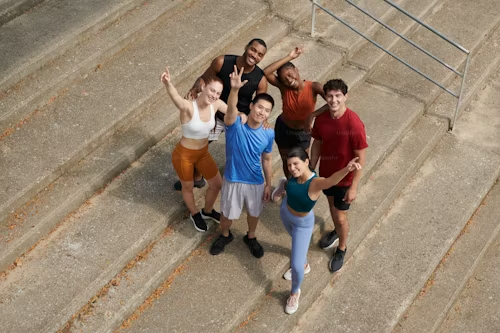
In today’s rapidly evolving world, education and personal growth are essential for unlocking your true potential and living a fulfilling life. Whether you are pursuing formal education, self-directed learning, or actively working on personal development, the synergy between learning and growth is a powerful catalyst for success. This article explores the profound connection between education and personal growth, offers practical strategies to enhance both, and answers some frequently asked questions to help you on your journey.
Understanding the Relationship Between Education and Personal Growth
The Role of Education in Personal Development
Education is often seen as the foundation for personal growth. It provides the knowledge and skills necessary to navigate the world, solve problems, and achieve career success. But beyond academics, education serves a much deeper purpose: it fosters critical thinking, expands your worldview, and empowers you to set meaningful goals.
Formal education—like schooling, college, and vocational training—gives you a structured environment to learn various subjects, but it also teaches valuable life skills such as time management, communication, and teamwork. These competencies are not only crucial in the workplace but are also vital for personal growth and development.
Lifelong Learning: A Key to Continuous Growth
Personal growth does not stop when formal education ends. Lifelong learning is a crucial part of staying competitive in today’s job market and keeping your mind active and engaged. Lifelong learning refers to the continuous pursuit of knowledge for personal or professional development, driven by curiosity and the desire to improve oneself.

By embracing lifelong learning, you can adapt to new challenges and opportunities, enhance your career prospects, and stay mentally agile. This mindset encourages not just the acquisition of new skills, but also the unlearning of outdated information and habits that no longer serve you.
How Personal Growth Fuels Educational Success
Personal growth is not just a byproduct of education; it also enhances your ability to learn. As you work on personal development, such as building resilience, improving emotional intelligence, or practising mindfulness, you create a better foundation for educational success. When you cultivate qualities like discipline and self-motivation, you are more likely to approach learning with enthusiasm, set realistic goals, and stay committed to achieving them.
The interconnected nature of education and personal growth means that progress in one area often leads to improvements in the other. Investing in your personal development will naturally lead to better educational outcomes while pursuing education can drive personal growth.
Strategies for Enhancing Education and Personal Growth
To maximize the benefits of education and particular growth, consider these practical strategies that will help you exceed in both areas
1. Set Clear, Achievable Goals
Setting specific, measurable, attainable, applicable, and time-bound ( SMART) pretensions is pivotal for both educational and particular growth. When you know what you want to achieve, it’s easier to stay motivated and measure your progress. Break down long-term pretensions into lower mileposts, and celebrate each accomplishment along the way. This not only keeps you focused but also boosts your tone- confidence.

2. Develop a Growth Mindset
A growth mindset, as opposed to a fixed mindset, is the belief that your capacities and intelligence can be developed through fidelity and hard work. People with a growth mindset grasp challenges, learn from review, and see trouble as a path to mastery. espousing this mindset will make you more flexible in the face of lapses and more likely to take on delicate tasks, which are essential for particular and educational growth.
3. Prioritize nonstop literacy
Make nonstop literacy a life choice by reading books, taking online courses, or attending shops. Thanks to the internet, coffers for lifelong literacy are more accessible than ever. spots like Coursera, Udemy, and Khan Academy offer courses in a variety of subjects, allowing you to learn at your own pace and according to your interests. This not only enhances your knowledge but also encourages curiosity and tone-enhancement.
4. Cultivate Emotional Intelligence
Emotional intelligence( EI) involves understanding and managing your feelings, as well as feeling and impacting the feelings of others. High EI is associated with better communication, conflict resolution, and leadership chops, which are all important in both particular and professional surroundings. Exercise tone- mindfulness, empathy, and emotional regulation to ameliorate your EI and, in turn, your connections and learning gests.
5. Embrace Failure as a Learning
Opportunity particular growth frequently involves prostrating failure. Rather than viewing miscalculations as lapses, see them as precious literacy gests. Reflect on what went awry, identify areas for enhancement, and apply these assignments to unborn trials. This station won’t only make you more flexible but also open you up to new educational openings without the fear of failure holding you back.
6. Find a Mentor or Join a Community
Having a tutor or being part of a community can accelerate your particular educational growth. Instructors offer guidance, share precious guests, and give formative feedback. Meanwhile, communities, whether online or offline, can offer support, responsibility, and networking openings. Consider joining forums, clubs, or study groups related to your interests and pretensions.
7. Practice Mindfulness and Self-Care
Mindfulness practices, such as meditation and yoga, can improve focus, reduce stress, and enhance learning capacity. Taking care of your mental and physical health is essential for sustaining the energy needed for personal growth and educational pursuits. Regular exercise, a balanced diet, and adequate sleep all contribute to a healthy body and mind, making it easier to stay motivated and engaged.
The Benefits of Integrating Education and Personal Growth
Integrating education with personal growth offers a wide array of benefits that can transform your life:
1. Enhanced Career Opportunities: Continuous learning and personal development can make you more adaptable, opening doors to new career opportunities and promotions.
2. Improved Mental Health: Education and personal growth encourage a positive mindset, which can reduce anxiety and depression.
3. Stronger Relationships: As you work on emotional intelligence and communication skills, you will find that your personal and professional relationships improve.
4. Increased Resilience: Personal growth teaches you to bounce back from adversity and view setbacks as learning experiences rather than failures.
5. Greater Life Satisfaction: Achieving educational milestones and personal growth goals can lead to a greater sense of accomplishment and fulfilment.
To truly thrive, make education and personal growth lifelong priorities. By doing so, you’ll continuously evolve, adapt to changes, and remain engaged with life’s challenges and opportunities.
FAQs: Education and Personal Growth
1. Why is lifelong learning important for personal growth?
Lifelong learning keeps your mind active and engaged, allowing you to adapt to new challenges and opportunities. It encourages a continuous improvement mindset, which helps you grow personally and professionally, stay competitive in your career, and maintain a sense of curiosity and fulfilment throughout life.
2. How can I integrate personal growth into my daily life?
Integrating personal growth into daily life can be as simple as setting aside time for self-reflection, practising mindfulness, reading books, or taking online courses. Small habits, such as journaling about your goals, practising gratitude, or learning a new skill, can have a significant impact over time.
3. What is the difference between formal education and self-directed learning?
Formal education follows a structured curriculum with specific goals and assessments, such as school or university programs. Self-directed learning, on the other hand, is more flexible and tailored to individual interests. It involves seeking knowledge through books, online resources, workshops, or practical experiences at one’s own pace.
4. How does emotional intelligence impact personal growth?
Emotional intelligence allows you to understand and manage your emotions, fostering better decision-making, conflict resolution, and interpersonal relationships. By improving your emotional intelligence, you become more adept at handling life’s challenges, which in turn accelerates personal growth.
5. Can personal growth improve my career prospects?
Absolutely. Personal growth enhances skills such as communication, time management, and problem-solving, which are highly valued in the workplace. Employers often seek individuals who demonstrate a commitment to continuous improvement, as it indicates adaptability and a proactive attitude.
6. How do I maintain motivation when pursuing long-term educational goals?
Maintaining motivation for long-term educational goals involves setting clear, achievable milestones, rewarding yourself for progress, and visualizing the benefits of achieving your goals. Surrounding yourself with a supportive community, finding a mentor, or joining study groups can also provide encouragement and accountability.
Embrace the Journey of Learning and Growth
Education and personal growth go hand in hand, fueling each other in a cycle that leads to a more fulfilled and successful life. By embracing lifelong learning, setting clear goals, and nurturing your personal development, you can confidently unlock your true potential and navigate life’s challenges. Start small, stay curious, and remember that every step you take towards education and personal growth is a step toward a better you.
Internal Links:
Blog Post on Self-Development
Link to a blog post on your site that discusses self-development strategies or personal growth tips. This helps readers explore related content on your site, encouraging them to stay longer.
Suggested anchor text: “Explore effective self-development strategies to enhance your growth journey.”
Blog Post on Lifelong Learning
If you’ve written about the concept of lifelong learning or the importance of continuous education, linking to this post would be valuable for readers who want to dive deeper.
Suggested anchor text: “Discover why lifelong learning is crucial for ongoing personal development.”
Blog Post on Goal Setting for Personal Growth
You can link to content that provides readers with actionable tips on goal setting about their personal growth.
Suggested anchor text: “Learn how to set goals that foster continuous personal development.”
External Links:
Article on the Impact of Education on Personal Development (Education.com)
Link to authoritative educational websites or research studies that back your points, such as studies on how education influences personal growth.
Suggested anchor text: “Read more about the profound impact education has on personal growth and self-improvement.”
UNESCO: The Power of Education for Personal and Social Change
UNESCO often publishes insightful reports on the transformative power of education for individuals and societies. This would be a valuable resource for readers interested in global perspectives on education.
Suggested anchor text: “Discover how education contributes to both personal and social transformation on a global scale.”
Harvard Business Review: Lifelong Learning Is the Key to Personal Growth
Link to reputable sources like Harvard Business Review to support claims about the importance of lifelong learning for personal growth and career advancement.
Suggested anchor text: “Learn why lifelong learning is a key factor in personal and professional growth.”








